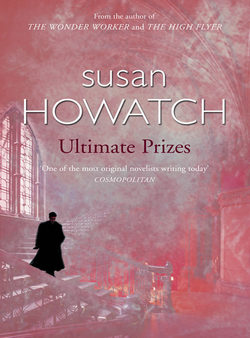Читать книгу Ultimate Prizes - Susan Howatch - Страница 8
I
ОглавлениеThe most appalling feature of the morning after I nearly committed adultery was my lack of surprise. I was scared out of my wits, racked by regret and almost prostrated by shame, but a virtuous amazement was notably absent. For some time my life had resembled a ball of wool kidnapped by a kitten, and now, after the preliminary unravelling, I was apparently experiencing the start of the inevitable tangled mess.
As we all know, adultery is far from uncommon, particularly in springtime and particularly among people in the prime of life, but it happens to be an activity which disqualifies me from my job; if a clergyman commits adultery he becomes spiritually disabled, unfit for further service. Even in that spring of 1945 when the entire population of England was no doubt gripped with the desire to celebrate the war’s end by wallowing in corybantic copulation, clergymen were still expected to keep their minds on God and their eyes on their wives. And why not? In my opinion such exemplary behaviour is the least that the Church of England should expect of its men. Everyone knows that all the best clergymen live in domestic bliss and never have an adulterous thought in their lives.
I was one of the best clergymen. I was forty-three years old and had already risen to a rank usually occupied by men in their fifties and sixties. ‘What is an archdeacon?’ my Germans had asked in their prison-camp on Starbury Plain, and when I had begun to explain how the diocese of Starbridge was divided into two archdeaconries, one of the Grade C men, the unrepentant Nazis, had exclaimed impressed: ‘Ah, so you’re the Bishop’s Gauleiter!’ I was sure I was no such thing, but the implication that I was a man of power and authority was true enough. As my Uncle Willoughby would have said, I had ‘Got On’ and ‘Travelled Far’ in my chosen profession, with the result that any possibility of moral failure was now quite unthinkable.
I thought about it. ‘Let him that thinketh he standeth take heed lest he fall,’ St Paul had written to the Corinthians, and on the morning after I almost committed adultery I found these words had assumed a new and sinister immediacy.
I knew what I had to do: I had to repent (which I did, with every fibre of my being), pray for forgiveness (which would be granted because of my genuine repentance) and go on being the first-class archdeacon which I undoubtedly was. Yet when I sank to my knees I found the formula was failing to work. My repentance, though genuine, was ill-defined and ultimately ineffectual. I did not understand why I had wound up in such a mess, and without understanding, how could I promise that my appalling behaviour would never be repeated?
I remained kneeling, not chatting garrulously to God like some woolly-minded mystic, but trying to concentrate on the spiritual force of Christ as I struggled for enlightenment, and gradually I felt strong enough to face a very unpalatable truth. The main reason I was now in such a spiritual mess was because three years ago, in the May of 1942, I had met Miss Diana Dorothea Tallent.
With a shudder I began to recall that seductive first meeting with Dido.
